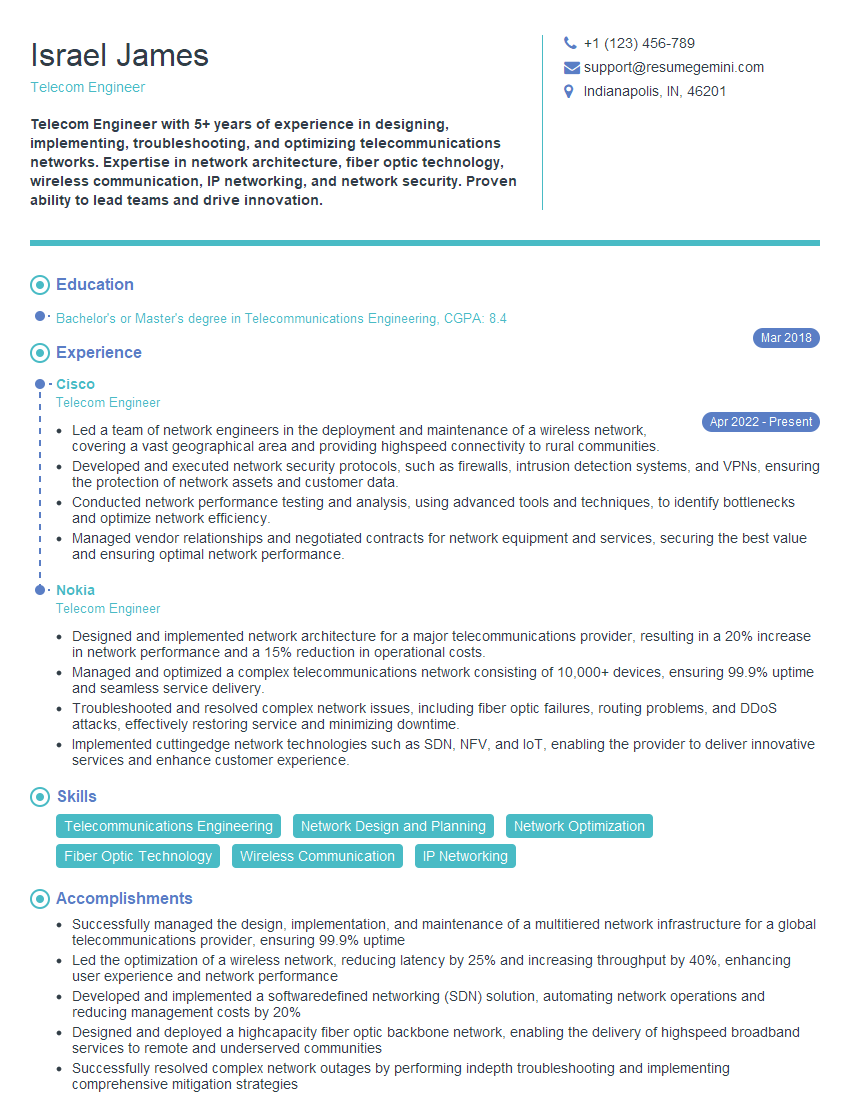Are you a seasoned Telecom Engineer seeking a new career path? Discover our professionally built Telecom Engineer Resume Template. This time-saving tool provides a solid foundation for your job search. Simply click “Edit Resume” to customize it with your unique experiences and achievements. Customize fonts and colors to match your personal style and increase your chances of landing your dream job. Explore more Resume Templates for additional options.

Israel James
Telecom Engineer
Summary
Telecom Engineer with 5+ years of experience in designing, implementing, troubleshooting, and optimizing telecommunications networks. Expertise in network architecture, fiber optic technology, wireless communication, IP networking, and network security. Proven ability to lead teams and drive innovation.
Education
Bachelor’s or Master’s degree in Telecommunications Engineering
March 2018
Skills
- Telecommunications Engineering
- Network Design and Planning
- Network Optimization
- Fiber Optic Technology
- Wireless Communication
- IP Networking
Work Experience
Telecom Engineer
- Led a team of network engineers in the deployment and maintenance of a wireless network, covering a vast geographical area and providing highspeed connectivity to rural communities.
- Developed and executed network security protocols, such as firewalls, intrusion detection systems, and VPNs, ensuring the protection of network assets and customer data.
- Conducted network performance testing and analysis, using advanced tools and techniques, to identify bottlenecks and optimize network efficiency.
- Managed vendor relationships and negotiated contracts for network equipment and services, securing the best value and ensuring optimal network performance.
Telecom Engineer
- Designed and implemented network architecture for a major telecommunications provider, resulting in a 20% increase in network performance and a 15% reduction in operational costs.
- Managed and optimized a complex telecommunications network consisting of 10,000+ devices, ensuring 99.9% uptime and seamless service delivery.
- Troubleshooted and resolved complex network issues, including fiber optic failures, routing problems, and DDoS attacks, effectively restoring service and minimizing downtime.
- Implemented cuttingedge network technologies such as SDN, NFV, and IoT, enabling the provider to deliver innovative services and enhance customer experience.
Accomplishments
- Successfully managed the design, implementation, and maintenance of a multitiered network infrastructure for a global telecommunications provider, ensuring 99.9% uptime
- Led the optimization of a wireless network, reducing latency by 25% and increasing throughput by 40%, enhancing user experience and network performance
- Developed and implemented a softwaredefined networking (SDN) solution, automating network operations and reducing management costs by 20%
- Designed and deployed a highcapacity fiber optic backbone network, enabling the delivery of highspeed broadband services to remote and underserved communities
- Successfully resolved complex network outages by performing indepth troubleshooting and implementing comprehensive mitigation strategies
Awards
- Received the Outstanding Telecom Engineer Award for significant contributions to network optimization and performance enhancement
- Awarded the Technical Excellence Award for pioneering advancements in fiber optic technology and deployment
- Honored with the Innovator of the Year Award for developing groundbreaking solutions to address network capacity challenges
- Recognized as a Telecom Engineer of the Year by the International Telecommunications Union (ITU) for outstanding contributions to the field
Certificates
- Certified Telecommunications Network Associate (CTNA)
- Certified Network Professional (CNP)
- Certified Network Engineer (CNE)
- Certified Wireless Network Administrator (CWNA)
Career Expert Tips:
- Select the ideal resume template to showcase your professional experience effectively.
- Master the art of resume writing to highlight your unique qualifications and achievements.
- Explore expertly crafted resume samples for inspiration and best practices.
- Build your best resume for free this new year with ResumeGemini. Enjoy exclusive discounts on ATS optimized resume templates.
How To Write Resume For Telecom Engineer
Quantify your accomplishments:
Use specific metrics and data to demonstrate the impact of your work on network performance, cost reduction, and customer satisfaction.Highlight your technical expertise:
Showcase your knowledge of telecommunications technologies, industry standards, and best practices.Emphasize your leadership skills:
If you have managed teams or projects, highlight your ability to lead, motivate, and achieve results.Tailor your resume to each job application:
Research the specific requirements of the job you are applying for and tailor your resume to match the skills and experience they are seeking.
Essential Experience Highlights for a Strong Telecom Engineer Resume
- Design and implement network architecture for telecommunications providers, ensuring performance, reliability, and cost-effectiveness.
- Manage and optimize complex telecommunications networks, including wired, wireless, and fiber optic infrastructure.
- Troubleshoot and resolve network issues, including fiber optic failures, routing problems, and DDoS attacks.
- Implement cutting-edge network technologies such as SDN, NFV, and IoT to enhance network performance and customer experience.
- Develop and execute network security protocols to protect network assets and customer data.
- Conduct network performance testing and analysis to identify bottlenecks and optimize network efficiency.
- Manage vendor relationships, negotiate contracts, and secure the best value for network equipment and services.
Frequently Asked Questions (FAQ’s) For Telecom Engineer
What are the key skills required to be a Telecom Engineer?
Telecommunications Engineering, Network Design and Planning, Network Optimization, Fiber Optic Technology, Wireless Communication, IP Networking.
What are the different types of telecommunications networks?
Wired networks, wireless networks, and fiber optic networks.
What are the challenges faced by Telecom Engineers?
Keeping up with new technologies, meeting customer demands, and ensuring network reliability and security.
What is the future of telecommunications?
The future of telecommunications lies in 5G networks, IoT, and the integration of AI and machine learning into network management.
How can I become a Telecom Engineer?
Earn a degree in Telecommunications Engineering, gain practical experience through internships or projects, and obtain relevant certifications.